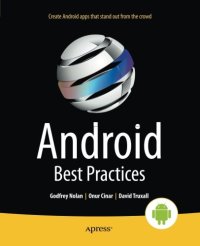
Ebook: Android Best Practices
Android Best Practices by Godfrey Nolan shows you how to make your Android apps stand out from the crowd with great reviews. Why settle for just making any Android app? Build a brilliant Android app instead that lets your users praise it for ease of use, better performance, and more.
Using a series of example apps which gradually evolve throughout this book, Android Best Practices brings together current Android best practices from user interface (UI)/user experience (UX) design, test-driven development (TDD), and design patterns (e.g., MVC) to help you take your app to the next level.
In this book you’ll learn how to:
• Use Android design patterns for consistent UI experience on many devices
• Use agile techniques such as test-driven development, behavior-driven development, and continuous integration
• Improve the speed and overall performance of your app
• Organize an Android app using design patterns such as MVC/MVP
• Create and consume REST and SOAP web services
Designing and developing an app that runs well on many if not all the leading Android smartphones and tablets today can be one of the most daunting challenges for Android developers. Well, this book takes much of the mystery out of that for you.
After reading and using Android Best Practices, you'll become a much better Android app designer and developer, which in turn can make your apps better placed and more successful in the market place.
What youll learn
- How to use Android design patterns for consistent UI experience on many devicesHow to use Agile techniques such as Test Driven Development, Behavior Driven Development and Continuous Integration
- How to test Android APKs on many devices and master device fragmentation
- Secure coding practices on Android
- How to organize an Android app using design patterns such as MVC/MVP etc.
- How to create and consume REST and SOAP web services
Who this book is for
This book is for Android developers looking to solidify their coding and overall app design and development skills.
Table of Contents
1. Before You Start2. UI/UX Design Patterns
3. Performance
4. Agile Android
5. NDK and Embedded Android
6. Security
7. Device Testing
8. Webservices